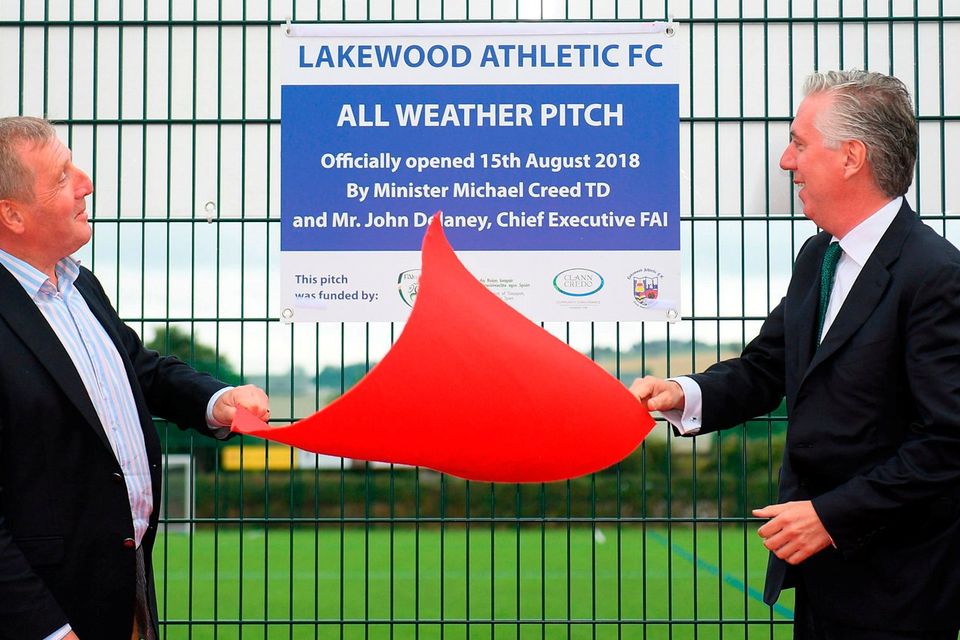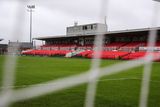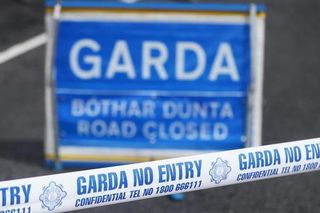The questions that John Delaney must answer at AGM as the FAI near deadlines set for Aviva debt
Talking point
FAI CEO John Delaney and Minister for Agriculture Michael Creed opening a new pitch at Lakewood FC in Cork last night. Photo: Eóin Noonan/Sportsfile
This morning, John Delaney will take a break from the jovial business of the Festival of Football to discuss the serious business of FAI finances ahead of Saturday's AGM in Cork.
There was a time when AGM week was all geared around one event but the FAI have changed strategy and turned it into a lengthy tour of the host county.
With FAI ambassadors in tow and cheques and awards to hand out, the vibes are positive. There's a presidential feel to the club visits.
But as Chief Executive Officer, Delaney is the paid member of a board whose primary function is to make decisions that shape the direction of the association.
And a fortnight ago, he held a press briefing at Abbotstown to provide an update on the financial picture as 2020 draws near - the initial date laid down by the FAI for clearing the debt from their contribution to building the Aviva Stadium.
It didn't quite go to plan. Delaney's headline message was the good news story that bank debt was down to under €30m.
"There's no doubt we had a debt of €70m," he said. "It's now for the first time under €30m and it will be under €20m next year."
One of the issues was that Delaney made the announcement in tandem with bank accounts dated to the end of 2017.
That document listed liabilities from bank loans and other loans at €38.2m with total liabilities at €48.3m - with a bank overdraft and 'trade and other payables' bumping up the figure.
We now know that the bank debt figure has been reduced in the intervening period, but Delaney was duly asked to clarify where the total liabilities now stand. The FAI indicated that additional questions should be put in writing in advance of a briefing this morning.
Although no FAI official will speak after Saturday's AGM, Delaney has been available to media on a number of occasions this year and it's clear that the Abbotstown authorities feel that the progress they have made in chipping away at the debt is worthy of recognition.
It should be straightforward enough to clear up any confusion over the up-to-date figures.
However, significant questions still hang in the air and they will have to be addressed today. The key queries can be split into two sections.
1. The chief executive said in May 2017 that a decision on the 2020 debt-free pledge would be made during the first half of 2018. What's the update?
2. Explain how you would clear the final €20m of debt between 2019 and 2020?
Delaney had hinted that delegates at Saturday's AGM would be given an answer on the debt dilemma.
Essentially, this point has been posed as a decision that could swing both ways. If the FAI opted to push out their repayment date, it might give them the flexibility to spend more in other areas. But the alternative is to meet the 2020 deadline and run a tight ship.
There is confidence that the figure can be paid off, and it's believed to be related to income that is due closer to 2020.
In the accounts, there is a reference to sponsorship renewals, TV contract extensions and grants available. Centralised TV funds from UEFA have added certainty to projections, and the renewal of Aviva naming rights has already been confirmed.
With regard to grants, the FAI have benefited from funding from UEFA, albeit with the terms and conditions unclear.
The FAI's 10-year tickets at the Ballsbridge venue will also be coming up for resale (the stadium opened in 2010).
These premium level tickets were supposed to finance the FAI's commitment to the stadium and there were predictions that the association would be seeing the dividends of that from 2016 onwards.
Indeed, the long-term prognosis from the FAI was that the second phase of ten-year tickets would be a 'pension' for the association.
The language around them has changed with the failure to shift the overpriced first batch - which were ambitiously launched at a cost ranging from €1,200 to €3,200 - adding to stadium debt which leads into the other lingering issues.
1. How much has the stadium cost the FAI to date?
2. What is the projected final cost of the stadium to the FAI?
The cost of building the Aviva Stadium was €411m with €191m of that coming from government funding and the balance paid jointly by the IRFU and the FAI.
When it came to 10-year ticket sales, the IRFU moved swiftly to sell all of their tickets on a flat rate of €1,500 per year and they ended up incurring a bank debt of €38m. The FAI, by contrast, were left with a €74m commitment.
They have made their capital payments but, naturally enough, there were interest payments that came in tandem with borrowing on that scale.
Over the course of the intervening period, they have changed banking partners and a switch to Bank of Ireland helped to reduce the interest payback from €4.25m (2016) to €1.6m (2017).
But the overall cost of the construction to Irish football needs to be clarified.
The FAI will say that the ability to attract marquee events such as the Europa League final and Euro 2020 should be factored into the equation.
Nevertheless, it has been a stressful decade under a number of headings and the removal of debt does not make the questions over the policy decisions that created a burden of that size any less valid.
The true cost of the ticket errors cannot be erased from memory.














